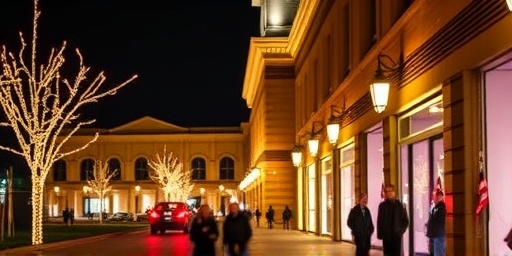As the holiday season lights up Denver’s streets with festive displays, local shoppers are approaching their gift-buying with uncharacteristic restraint. Amid swirling concerns over potential tariffs and persistent inflation, consumer sentiment in the Mile High City is cooling, with many planning to cut back on Holiday spending compared to last year. Yet, in a striking counterpoint, U.S. retailers nationwide are bracing for a blockbuster holiday period, projecting total retail sales to eclipse $1 trillion for the first time ever—a figure that underscores the resilience of America’s shopping culture even in uncertain times.
This dichotomy highlights the broader economic tensions gripping the nation. Recent surveys reveal that while overall Holiday spending is expected to rise modestly by about 2.5% to 3.5% from 2023, individual consumers, particularly in urban hubs like Denver, are dialing back due to fears of higher prices driven by tariffs and inflationary pressures. The National Retail Federation (NRF) estimates that total holiday retail sales could hit between $1.02 trillion and $1.1 trillion this season, fueled by strong online shopping and promotions. However, in Denver, where the cost of living has surged 5.2% year-over-year, locals are prioritizing essentials over extravagance.
Denver Shoppers Navigate Tariff Fears and Price Hikes
In the heart of Denver’s bustling Larimer Square, shoppers like Maria Gonzalez, a 35-year-old teacher, are meticulously planning their budgets. “Last year, I spent about $800 on gifts for family and friends,” Gonzalez shared during a recent interview outside a holiday pop-up market. “This time, with talk of new tariffs on imports, I’m aiming for $600 max. Everything from electronics to toys feels like it’s going to cost more.” Her caution echoes a wider trend: a University of Michigan consumer sentiment index reading dipped to 70.1 in November, the lowest since mid-2022, largely attributed to tariff anxieties following election rhetoric promising steep duties on Chinese goods.
Tariffs, a hot-button issue in the upcoming administration, could add up to 10-20% to the price of imported holiday staples like apparel and consumer electronics, according to economists at the Peterson Institute for International Economics. In Denver, where international trade influences retail availability—think affordable gadgets from Asia—shoppers are already feeling the pinch. Local data from the Denver Metro Chamber of Commerce shows that 62% of residents surveyed in October plan to reduce Holiday spending, citing inflation and potential trade barriers as top concerns. Inflation, hovering at 3.2% nationally but biting harder in Colorado’s housing and grocery sectors, has eroded purchasing power; the average Denver household now allocates 28% more of its budget to necessities than five years ago.
Retail sales in the region reflect this wariness. Brick-and-mortar stores along the 16th Street Mall reported a 4% dip in early November foot traffic compared to 2023, per city economic reports. Online alternatives are gaining traction, with platforms like Amazon seeing a 15% uptick in Denver-area searches for “budget holiday gifts.” Yet, this shift isn’t all doom and gloom—savvy consumers are turning to local artisans and second-hand markets, boosting Denver’s indie retail scene.
Retailers Bullish on National Holiday Sales Despite Headwinds
While Denverites tighten their purse strings, the national retail landscape paints a rosier picture. Major chains like Walmart, Target, and Best Buy are forecasting robust holiday sales, driven by aggressive discounting and e-commerce innovations. The NRF’s projections mark a historic milestone: surpassing $1 trillion in holiday retail sales, which encompass November and December purchases across all channels. This would represent a 2.5-3.5% increase over last year’s $994 billion, propelled by categories like apparel (up 3.1%) and toys (up 4.2%).
“Consumers may be cautious, but they’re not stopping their holiday traditions,” said Matthew Shay, president and CEO of the NRF, in a statement released last week. “Retailers have invested heavily in supply chain efficiencies and personalized promotions to make shopping accessible.” Indeed, despite tariff threats, inventory levels are up 8% from pre-pandemic norms, ensuring shelves stay stocked. Online retail sales, which accounted for 22% of total holiday spending last year, are expected to grow by 9-11% this season, per Adobe Analytics forecasts.
In a bid to counter consumer sentiment dips, retailers are rolling out early Black Friday deals and loyalty programs. For instance, Macy’s has launched a “Tariff-Proof Pricing” initiative, guaranteeing no price increases on select items through December. This strategy aims to mitigate inflation’s impact, where core goods prices have risen 4.1% annually. Economists note that while tariffs could shave 0.5% off GDP growth in 2025, the immediate holiday boost might cushion the blow, with retail sales contributing 1.2% to U.S. economic output.
Inflation’s Grip on Consumer Sentiment Shapes Buying Habits
Consumer sentiment, a barometer of economic confidence, is at the epicenter of this holiday paradox. The Conference Board’s latest index shows a 7-point drop to 99.3 in October, with inflation topping the list of worries for 68% of respondents. In Denver, where median home prices have climbed to $575,000—a 6% yearly increase—the squeeze is palpable. Families are reallocating funds: a local poll by 9News found that 55% of Coloradans intend to spend under $500 on holiday gifts, down from $650 in 2023.
This shift is influencing retail sales patterns. Essentials like groceries and fuel are devouring budgets, leaving less for discretionary holiday spending. The U.S. Bureau of Labor Statistics reports that food-at-home prices rose 1.1% in the past year, while energy costs spiked 2.4% amid global tensions. For Denver’s middle-class shoppers, this means trading down: opting for store brands over name brands, or digital gifts like streaming subscriptions over physical items.
Experts weigh in on the psychology behind this. “Inflation erodes trust in the economy, leading to defensive spending,” explains Dr. Elena Ramirez, an economist at the University of Colorado Denver. “But holidays are emotional—people will splurge on experiences, like family outings, over material goods.” Her analysis aligns with data showing a 12% rise in bookings for holiday events in the Rocky Mountain region, per Eventbrite metrics. Meanwhile, luxury retail in Cherry Creek North reports steady high-end sales, as affluent shoppers shrug off broader consumer sentiment woes.
- Key Shifts in Holiday Spending: 45% of Denver consumers plan to shop more online to avoid crowds and compare prices.
- 38% are focusing on sustainable, locally made gifts to support the economy.
- 27% cite tariffs as a direct reason for cutting back on imported electronics.
These habits could reshape retail sales long-term, pushing stores toward omnichannel strategies that blend physical and digital experiences.
Local Denver Retailers Adapt to Cautious Shoppers
Denver’s retail ecosystem is a microcosm of national trends, with small businesses and chains alike adapting to tempered holiday spending. At Tattered Cover Book Store in LoDo, owner Kristen Gilligan notes a surge in affordable book bundles. “We’re seeing customers who used to buy hardcovers now choosing paperbacks or used sections,” she said. “But our holiday events are drawing crowds—people want value and community.” Sales projections for independent bookstores nationwide are up 5%, buoyed by a backlash against big-box uniformity.
Larger players like REI in Denver’s Belleview Station are leveraging outdoor enthusiasts’ loyalty. With inflation hitting travel costs, locals are gifting practical gear like insulated jackets, which have seen a 10% sales bump. “Tariffs on imported fabrics worry us, but we’re sourcing more domestically,” shared store manager Alex Thompson. City-wide, the Denver Retail Council anticipates a 1.8% overall sales increase, lagging the national average but still positive.
Promotions are key: flash sales, buy-one-get-one deals, and contactless payments are encouraging cautious spenders. A Colorado Fiscal Institute report highlights that low-income households, hit hardest by inflation, are twice as likely to use credit cards for holidays, potentially leading to post-season debt spikes. Retailers are responding with financial literacy tie-ins, like budgeting workshops at malls.
Outlook: Balancing Caution with Holiday Optimism
Looking ahead, the holiday season could set the tone for 2025’s economic narrative. If retail sales indeed top $1 trillion, it would signal consumer resilience against tariffs and inflation, potentially stabilizing jobs in the sector, which employs 15 million Americans. In Denver, city officials are monitoring closely; a strong holiday could inject $2.5 billion into the local economy, per chamber estimates, funding infrastructure amid rising costs.
However, persistent low consumer sentiment might prolong caution into the new year, with 40% of shoppers planning to carry debt from holiday purchases, according to a TransUnion survey. Retailers are already eyeing post-holiday clearances to clear inventory, while policymakers debate tariff implementations that could further stoke inflation. For now, Denver’s shoppers embody the season’s spirit—hopeful yet prudent—ensuring the holidays remain merry, if modestly so.
As Black Friday approaches, experts urge balanced spending: prioritize joy over excess, and watch for deals that offset economic headwinds. The record-breaking potential of national retail sales offers a bright spot, reminding us that even in uncertainty, the act of giving endures.








